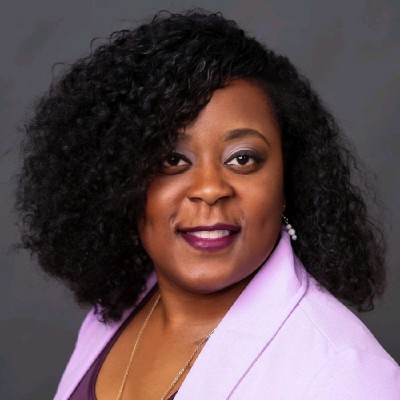From a Bold Idea to an AI Movement: How MSAIC Is Uniting Education, Community, and Industry to Lead in the Future of Work
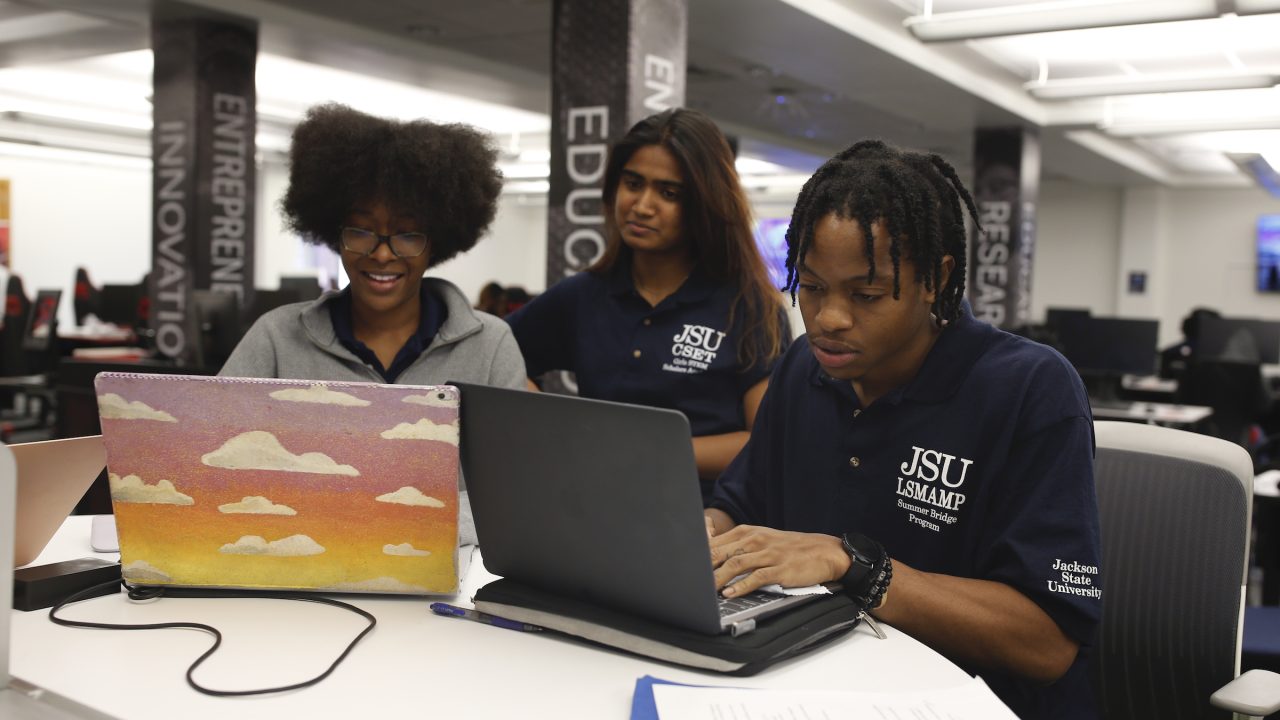
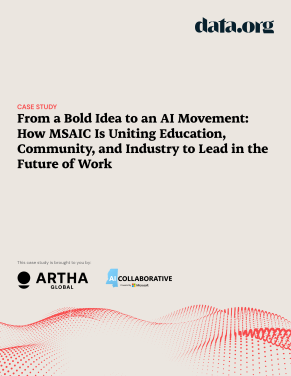
Download the Case Study
Setting the Stage
The Mississippi AI Collaborative (MSAIC) was born around a dinner table, when five experts from four organizations realized they were chasing one ambitious goal from different directions: advancing education, workforce, and community through the use of artificial intelligence1.
That ambition grew out of years of frustration. Almost half of Mississippi’s college graduates and workers leave the state each year, causing a steady brain drain that hurts communities and slows growth. From 2010 to 2024, 80,000 more residents left the state than moved in, according to the Census Bureau. Internet broadband adoption in Mississippi (80%) remains lower than the rest of the states (88.4%)2, tech jobs are limited, and small businesses, which make up 99.3% of the state’s economy, often lack the resources to adopt new technologies. A further mismatch between education and workforce needs has only made it harder for young people to stay and thrive.
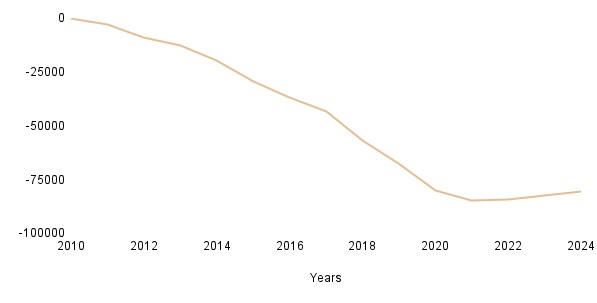
Yet Mississippi has already shown that change is possible. The public school system, once ranked near the bottom nationally, rose to 16th place in 2023 after a decade of targeted investment in literacy and teaching. That success proved that long-standing barriers could be overcome with focus and collaboration. MSAIC was created in this same spirit: to transform how Mississippi learns, grows, and works through artificial intelligence to drive prosperity across the state.
In March 2023, the same four organizations came together to create the foundation of MSAIC: the Computer Science Teachers Association (a curriculum support teachers’ network), Jackson State University, The Bean Path (a tech nonprofit focused on community empowerment), and the Mississippi Coding Academies (an alternate model focused on workforce training). Each brought a different strength, from classrooms and universities to community outreach and workforce training, improving credibility across education, the community, and industry. With support from data.org, they chose to join forces and imagine a future where Mississippi leads in artificial intelligence.
From the outset, the vision was clear. Instead of treating artificial intelligence as solely a looming threat, MSAIC sought to reframe it as ‘a valuable tool to enhance and evolve one’s role.’ The mission was ambitious yet deeply grounded in Mississippi’s needs: to transform how the state learns, works, and grows through AI. And today those efforts are already reaping results, with MSAIC having engaged over 3,400 Mississippians in AI skilling programs, training over 1,400 educators, supporting 86 businesses, and reaching about 66,000 people through online platforms.
Every student, educator, and small business, no matter where they are, should have access to the training, tools, and opportunities needed to thrive in today’s digital economy. “I want when someone looks at a Mississippian in 25 years to look at them and say, they’re an AI entrepreneur,” says David Collins, chair of MSAIC, as he envisions the state’s future.
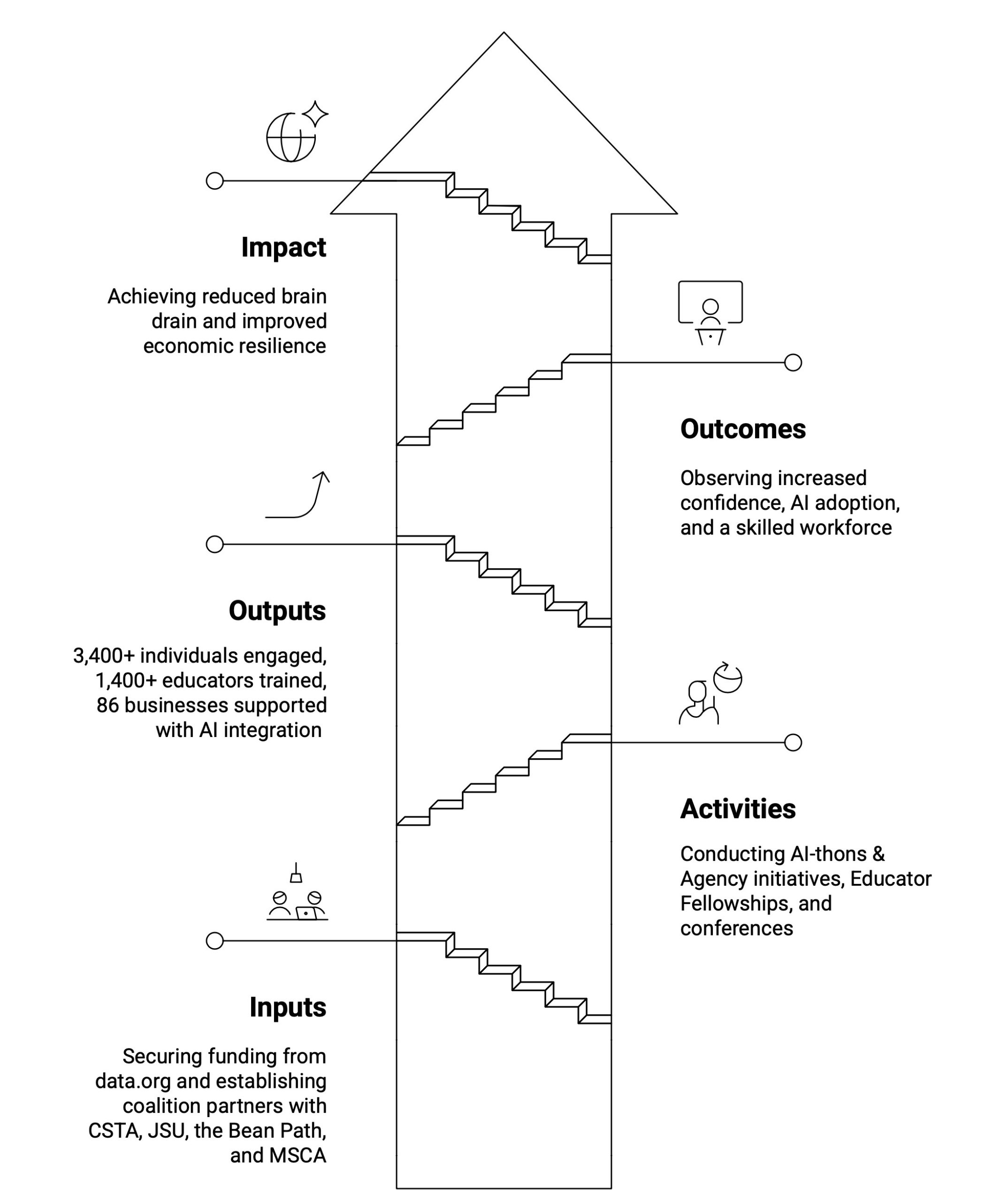
The Founders’ Story
MSAIC was not the brainchild of one person, but of five leaders whose paths converged around a shared belief: to make sure technology is used as a force for empowerment over exclusion.
It is precisely this diversity that gives MSAIC its strength: a coalition of educators, entrepreneurs, and community leaders united by the conviction that Mississippi’s future can be reshaped through AI.
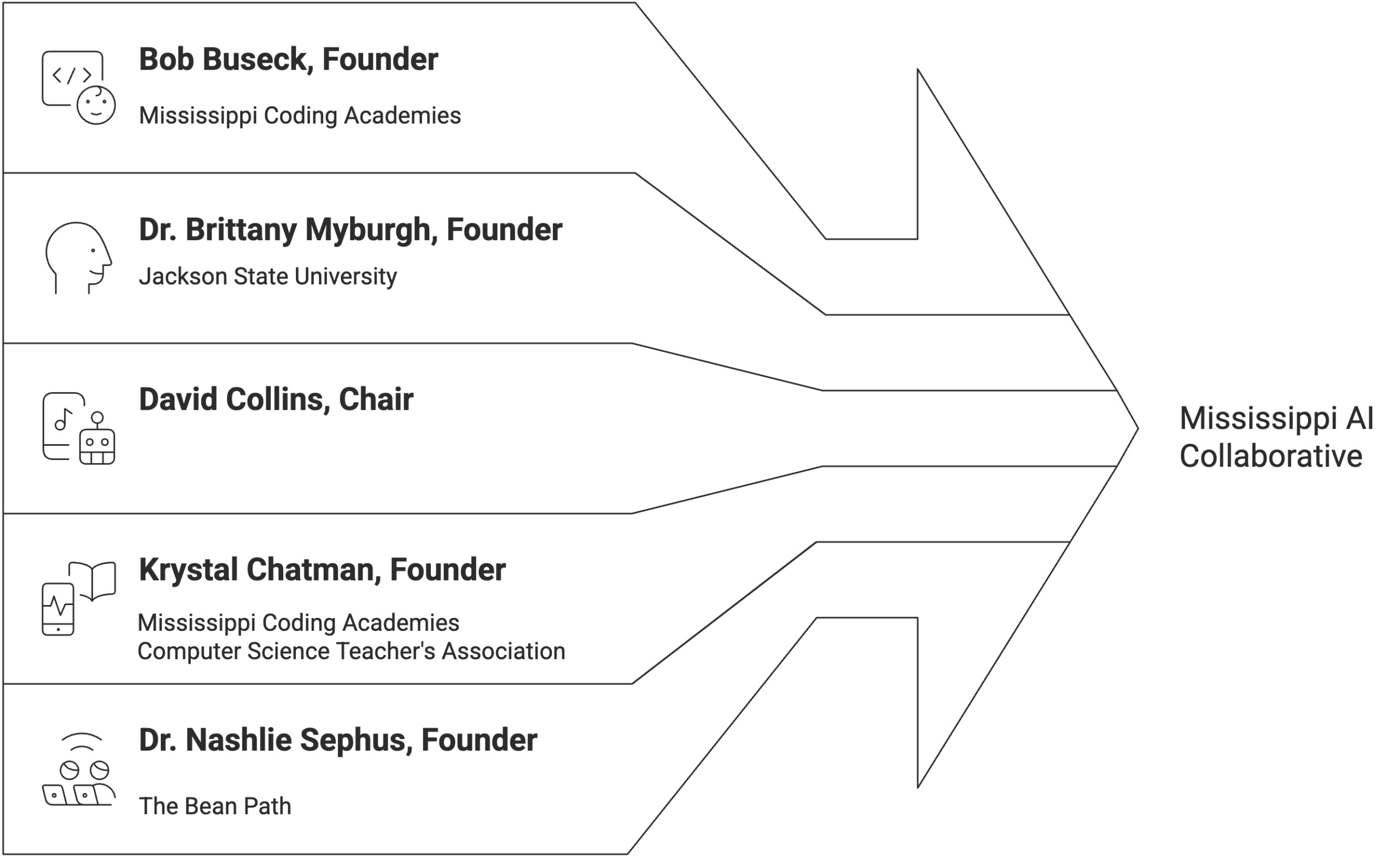
Launching the Collaborative
MSAIC took shape also at a time when generative AI moved from novelty to necessity. Each of the founders had been running their own programs (coding academies in the Mississippi Delta, outreach sessions in libraries, university projects with students or grassroots community initiatives), but all confronted similar limitations: fragmented resources and communities that risked being left behind as AI advanced.
When the opportunity came to apply for the Generative AI Skills Challenge, presented by data.org and Microsoft, MSAIC saw a chance to bring its vision to a global stage. Designed to spotlight community-driven solutions for economic mobility, the challenge provided both visibility and essential resources. They emerged as one of the winners, securing a $250,000 grant to scale their work. Further, Microsoft continued to be a key supporter—helping to drive initiatives like the AI-thon and Southern Spark, which proved instrumental to MSAIC’s success in its first year. Beyond funding, the broader partnership opened doors to technical expertise, mentoring, and global best practices in AI adoption—equipping the collaborative with the credibility and capacity to accelerate its mission.
As Dr. Brittany Myburgh recalled, “We first heard about the Challenge from JJ Townsend at Microsoft. The grant didn’t just give us funding; it gave us the structure to scale what we were already trying to do.” This led to a loose network of educators and innovators crystallizing into a formal alliance with a shared mission: to give Mississippians the confidence and skills to use AI in ways that directly serve their lives and livelihoods.
From the outset, the collaborative model was intentional. Krystal empowered teachers, Brittany linked students with businesses, Nashlie built community trust, David supported entrepreneurs, and Bob advanced workforce readiness. Together, they shaped MSAIC as a comprehensive ecosystem rather than a single program.
MSAIC’s Model for Impact
MSAIC set out to support Mississippians across the full cycle of learning and work: from sparking curiosity in K-12 classrooms to preparing university students for jobs, and from helping small businesses adopt AI to enabling graduates and educators to pass knowledge on to others. The aim is that every citizen can find a place in the state’s digital future.
From the start, the founders rejected a one-size-fits-all model. They designed programs that meet people where they are, whether beginners, small business owners, students, or experienced teachers.
- AI Agency: Based at Jackson State University, it matches students trained in generative AI with small businesses that lack access to technical expertise. For students, it provides applied learning and a pathway into the workforce, while for businesses, it offers affordable, immediate solutions, whether drafting marketing materials or automating back-office tasks. As Dr. Brittany Myburgh put it, “The Agency makes AI real. Students aren’t just learning tools in the abstract, they’re solving problems for people down the street.”
- Educator Fellowship: Teachers build their own AI projects and lead workshops tailored to local needs, which spreads expertise well beyond one classroom. MSAIC also stresses on a teach the teachers approach, which makes this program crucial, empowering educators as advocates, multiplying impact well beyond a single classroom.
- AI-thon: Community events in schools, libraries, and halls where residents of all ages try AI in friendly, informal settings. “People show up for the food,” Dr. Nashlie Sephus said with a smile, “but they leave with a new sense of what AI can do for them.”
- Southern Spark Conference: An annual forum that brings educators, entrepreneurs, policymakers, and students together to shape Mississippi’s AI future.
A common thread of responsible data and AI runs through every program. Participants are encouraged to ask who owns the data, what the risks are, and when choosing not to use a tool is the right decision. This ethos is also guiding the initiative’s early work, Mississippi GPT, a locally relevant gen AI intended to demonstrate that safe, community-driven AI is possible.
Taken together, MSAIC’s programs reflect a deliberate philosophy: respect people’s pace of learning and create visible wins that build lasting confidence. The results of this approach? Already evident.
Impact so far
In its first year, MSAIC turned vision into outcomes that can be counted and felt. More than 3,400 people have taken part across programs, over 1,400 educators have been trained, 86 businesses have received support, and online content has reached about 66,000 people. Progress is tracked through sign-ups, pre- and post-surveys, feedback forms, participation records, and digital analytics.
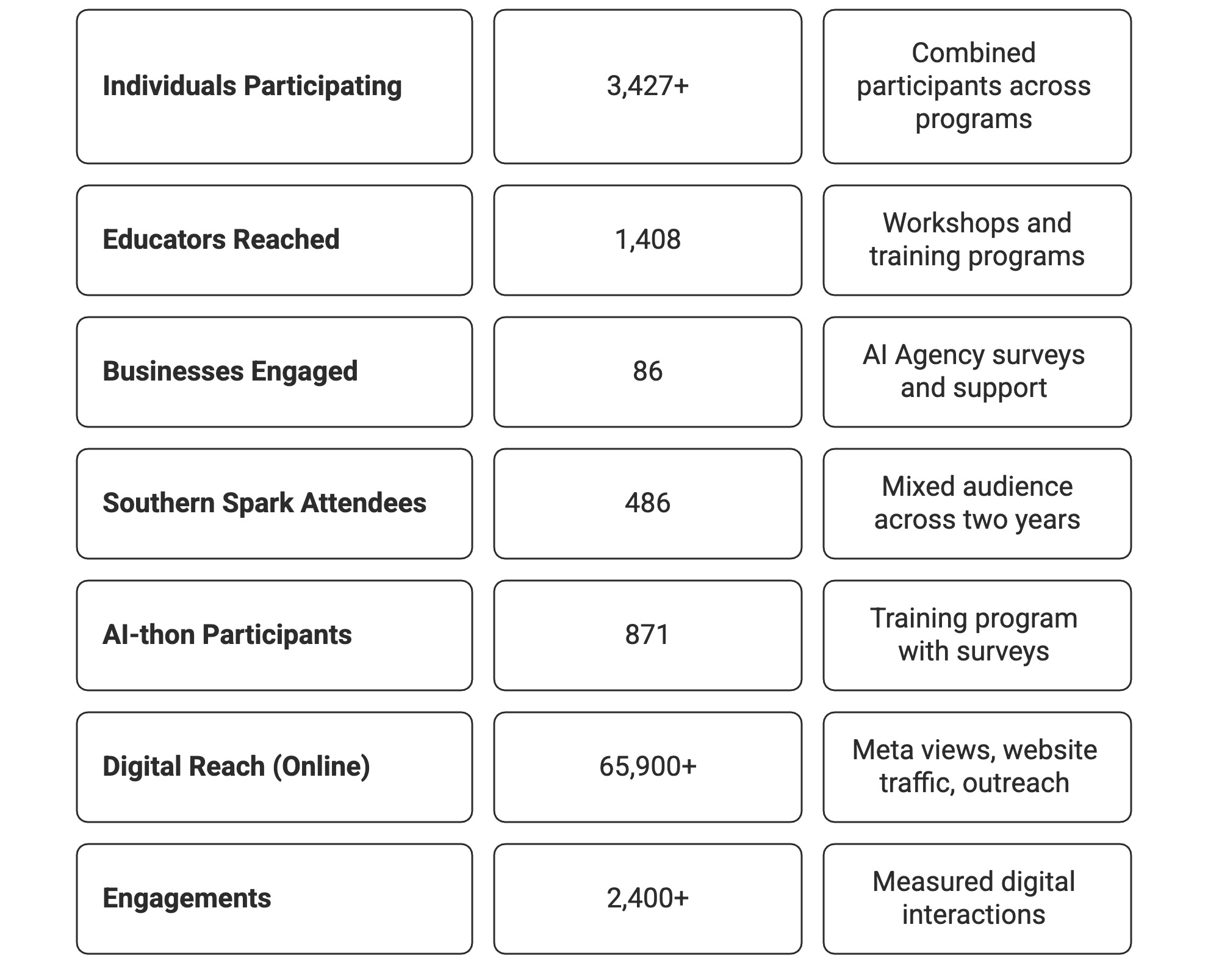
Across MSAIC’s initiatives, participation has been both broad-based and diverse:
- The AI-thon attracted 871 participants, with women (75%) and Black or African American learners (68%) leading the charge, demonstrating strong grassroots engagement in Mississippi. It also tracked the regional impact of the AI-thon for six months in 2024 and saw near-equal engagement across urban and rural communities. As one participant shared, “I enjoyed all the training. It was easy to understand, and I could do it at my own pace.” Many also expressed interest in deeper discussions on the ethical implications and future of AI, pointing to a desire to engage critically with technology.
- The Educator Fellowship reached over 1,400 educators, largely experienced teachers (60% aged 35–54). Their motivations combined curiosity and practicality, with one educator noting, “For three years, I researched and studied teacher burnout… This understanding created a huge passion to learn all things AI to help combat the unnecessary stress that extra workloads cause.”
- The AI Agency for small businesses supported 86 clients, the majority women (71%), with a younger profile (29% aged 25–34) and broader ethnic diversity, including South Asian (14%) and Indigenous/Multi-ethnic (14%) representation. These businesses included professional services, manufacturing, real estate, health, education, art, beauty, food/ catering, agriculture, and innovation. Feedback from AI Agency surveys highlighted both client satisfaction and the challenges students helped address. The results showed that clients consistently valued the step-by-step guidance, expert support, and tailored AI recommendations spanning branding, web development, and practical tool use for business growth.
These patterns highlight MSAIC’s success in mobilizing women, engaging Black communities at scale, and bringing both seasoned educators and diverse entrepreneurs into the AI ecosystem.
Testimonials
The striking impact created by MSAIC is also reflected in personal stories.
As a small business in Jackson, before joining the AI Agency, I would spend weeks trying to update the website on my own. With the Agency’s guidance, the process became quicker and clearer, and for the first time, I felt my online presence was actually reaching new customers.
Small business owner
I started as a student mentor in MSAIC’s accelerator and spoke about how the experience opened my eyes to the possibilities of AI. I am now building an app that uses AI to tackle health problems common in Mississippi, a project that I would never have imagined without that early exposure.
Former student mentor
As a health educator, with the help of AI, I am able to draft posts about my awareness campaign in a way that they landed well through effective social media and website development.
Health educator
Exhibit 5: Testimonials
These personal journeys reflect the broader impact across programs. Teachers report new confidence and are sharing methods with colleagues. Participants at the AI-thons said the training was practical, relevant, and immediately useful in their work and daily lives. And at the Southern Spark Conference, hundreds of educators, entrepreneurs, and policymakers came together to set a shared agenda for Mississippi’s AI future.
Collaboration with data.org
The data.org grant has been instrumental in kicking off the collaborative. “We simply wouldn’t be here without them”, remarked David Collins. The team also recalls that data.org has been more than just a funder; it provided crucial early validation, helped shape MSAIC’s evaluation framework, while also continuing to guide its impact measurement.
MSAIC works closely with data.org to regularly share metrics and outcomes, including participation numbers, demographics, skills gained, confidence levels, and shifts in perception. Through participation surveys, they track not just how many people attend each program, but also the proportion of women and underrepresented groups reached, satisfaction scores, and whether participants found the training practical and relevant to their lives. This approach supports accountability, fosters continuous learning, and enables data.org to provide targeted insights that help strengthen MSAIC’s work.
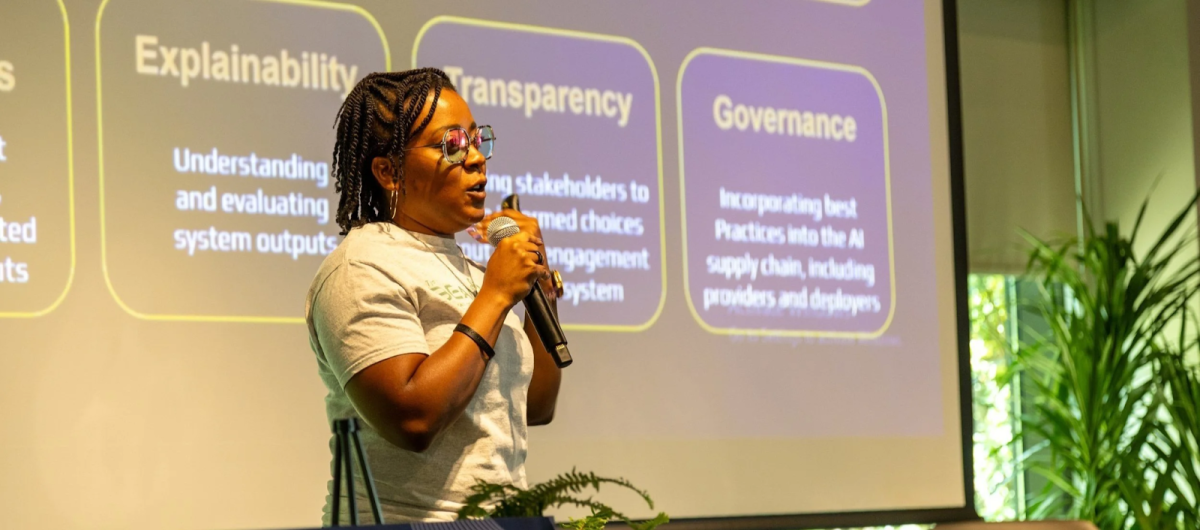
Looking Ahead
In little over two years, MSAIC has shown how a bold idea can become a movement. What began as a conversation around shared frustrations has grown into an ecosystem of programs that make AI practical and accessible for Mississippians.
The impact is already visible in numbers and in stories. From businesses to students, over three thousand Mississippians have engaged with MSAIC’s work. Just as importantly, the collaborative has shifted perceptions: AI is no longer seen only as a distant or intimidating technology but as something that can open doors to opportunity right at home.
Looking ahead, the founders are ambitious. They envision expanding across the Southeast, growing the AI Agency into a model for workforce development, scaling the Educator Fellowship nationally, and pushing forward bold ideas like Mississippi GPT.
Currently in the process of securing funding from both private and federal sources, they are committed to continuing this work because they believe in its transformative potential and have the early results to prove it. Their goal is not just to prepare people for a changing economy but to place Mississippi at the forefront of it. If the state once struggled to keep pace, MSAIC shows that with vision, collaboration, and persistence, Mississippi can set the pace for others to follow.
- https://www.mississippiai.org/ ↩︎
- https://extension.msstate.edu/publications/exploring-broadband-adoption-mississippi ↩︎
This case study is brought to you by:



